Behind the News
Behind the News: All the backstories to our major news this week
Published
4 months agoon

Over the past week, there were lots of important stories from around the African continent, and we served you some of the most topical ones.
Here is a rundown of the backstories to some of the biggest news in Africa that we covered during the week:
1. Tinubu, Shettima on the cusp of history
Most African leaders have a tendency for setting unwanted record especially when it comes to things that do not add meaningful value to their citizens.
When it comes to junketting around the world, leaders on the continent will always break records as they spend more time outside their countries than inside with the worn-out excuse of looking for foreign investors.
Nigeria’s President Bola Tinubu is not an exception here as he and his Vice, Kashim Shettima have already spent an accumulated 91 days outside the shores of the country since being sworn in on May 29, 2023.
A research by a Nigerian media outfit has revealed that in just seven months,
Tinubu and Shettima have visited 16 countries collectively and individually in foreign engagements and personal capacities.
“Checks have revealed that President Tinubu had so far visited Paris, France (twice); London, the United Kingdom; Bissau, Guinea-Bissau (twice); Nairobi, Kenya; Porto Norvo, Benin Republic; New Delhi, India; Abu Dhabi and Dubai, the United Arab Emirates; New York, the United States of America, Riyadh, Saudi Arabia and Berlin, German, spending 55 days,” the report stated.
The report also reveal that Shettima had visited countries like Italy, Russia, South Africa, Cuba, China, and the US to either represent Tinubu or attend one event or the other, spending 36 days abroad.
As it stands, Tinubu may end up breaking the record set by his predecessor, Muhammadu Buhari, who reportedly spent an accumulated 325 days away from the country between assuming office in 2015 and 2023 when he handed over to Tinubu.
One may not be wrong to link Tinubu’s pledge to carry on with the legacies left behind by Buhari and travelling around the world is definitely one of such legacies.
2. War without end as Zambia’s Socialist Party take on President Hichilema
The political crisis that has continued to rock Zambia with opposition parties stacking up against President Hakainde Hichilema came into life yet again when the Socialist Party took him on over alleged divisive tribal utterances.
Leader of the SP, Fred M’membe, who called out the President during the week, accused him of feeling threatened politically and resorting to tribalism to hold on to his position.
While addressing a press conference in Lusaka, M’membe, alleged that Hichilema made some tribal remarks during the end of year media briefing at Mulungushi International Conference Center and at the new year rally held in Choma, Southern Province.
“Even when Hichilema feels threatened, we urge him to refrain from retreating to tribal utterances,” M’membe said.
“The executive is in shambles. It has become very tribalistic and very regional. The governance system has been weakened.”
“For us in the political arena, we closed the year on a very sad note. The liberties that our forefathers fought for were eroded,” the SP leader lamented.
M’membe also accusing the ruling United Party for National Development (UPND) of lacking respect for the laws of the country and had allegedly destroyed Parliament including the judiciary.
The troubles facing Hichilema in the over two years he has been in power have continued to pile up as more and more opposition figures have been relentless in pushing him to the edge.
3. Funke Akindele: From kid TV star to history maker
The maxim that says “when someone’s fortune is written in the stars, it takes little effort to get to the top” can be said to have had Nigerian actress and filmmaker, Funke Akindele well spelt out.
From a tender age of 10 when she became a regular fixture on Nigerian television as a kid star in the sitcom “I Need to Know” from 1998 to 2002, Funke had transformed into a household name in the Nigerian movie industry, transforming from that starry-eyed girl to the popular “Jenifa” character she created with one of her early movies of the same name.
She went on to create a very successful sit-come, “Jenifa’s Diary” which is one of the most watched comedy series in the country.
Akindele, a lawyer by training, has now made history after her new movie, “A Tribe Called Judah”, became the first ever Nollywood movie to earn N1 billion at the box office.
Before the history making movie, she had also set two previous records of grossing N636 million and another N668 million with her movies “Omo Ghetto: The Saga” and “Battle on Buka Street.”
4. Dangote loses top spot as Africa’s wealthiest man as SA’s Rupert takes over
In a case of the rich also cry,
Nigeria’s richest man, Aliko Dangote, has lost his position as Africa’s wealthiest man to South Africa’s business mogul, Johann Rupert.
According to a new list released by Forbes Magazine, Dangote dropped to second place on the Forbes Daily Billionaires ranking platform as his wealth plummeted from $13.5 billion in 2023 to $9.5 billion at the beginning of 2024.
The Nigerian billionaire’s drop from the number one spot is basically linked to the depreciation of the Naira as well as other economic problems bedevilling the country, including the harsh economic crisis occasioned by policies put in place by the President Bola Tinubu-led administration.
However, Dangote is not alone as Mike Adenuga, the owner of Globacom also dropped to the 10th spot, while another Nigerian billionaire, Rabiu Abdulsamad, the owner of BUA Group, also dropped to the 5th spot from the 3rd spot he had hitherto occupied.
5. Oscar Pistorius finally gets parole
Former South African double amputee Olympic sprinter, Oscar Pistorius, was, on Friday, January 5, released from prison on parole, after spending 11 years in jail for the murder of his model girlfriend, Reeva Steenkamp, in 2013.
Though the 37-year-old who was popularly known as “The Blade Runner” in his heyday was released from the Atteridgeville Correctional Centre in Pretoria, he will begin a new life of supervised freedom, which will require him to get permission from authorities for many of the basic events of life, according to prison officials.
“Just like other parolees, Pistorius is subject to general parole conditions. He is restricted from conducting media interviews; he will be required to be home at particular hours of the day.
“He will not be allowed to consume alcohol or prohibited substances and will be required to participate in programs identified by the Correctional Supervision and Parole Board,” Skouth African Department of Correctional Services (DCS) spokesman, Singabakho Nxumalo, told journalists.
Pistorius fell from his glorious height of being the only amputee athlete to compete with able-bodied athletes, to the ignominy of being convicted for murder when he was found guilty of shooting dead the 29-year-old law school graduate on Valentine’s Day of 2013.
All through his trial, Pistorius had maintained that he did not kill her in a fit of anger during an argument as prosecutors argued, and said instead he had mistaken her for an intruder.
You may like
-


Clergyman raises concern over abuses associated with digital rights and freedom of expression
-


Nigeria’s Dangote refinery set to get valid operating licence
-


In 30 years, half of Nigerian biscuit companies went out of business— Manufacturers
-
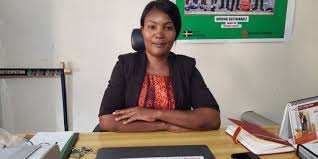

Conservationist, Kearns, names intolerance and digital media abuse as threats to media freedom
-


Nigeria gets $600 million investment from Danish firm Moller-Maersk
-
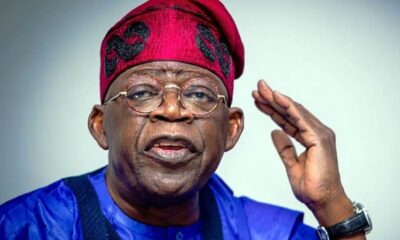

I saved Nigeria from bankruptcy by removing fuel subsidy— Tinubu
Behind the News
Behind the News: All the backstories to our major news this week
Published
4 days agoon
April 28, 2024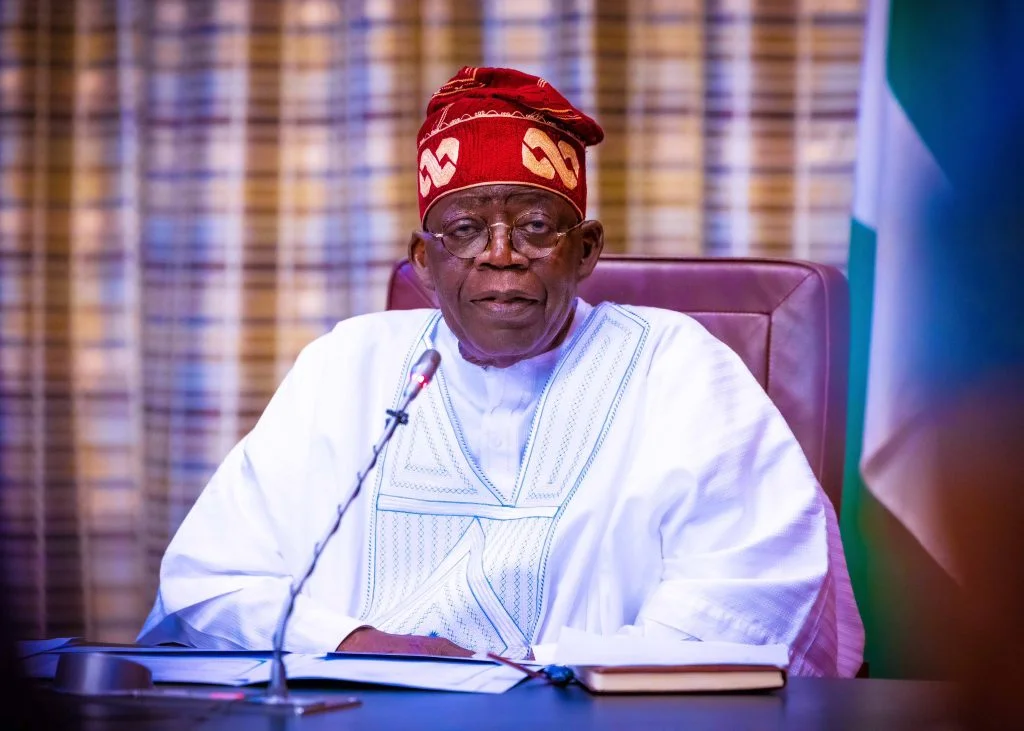
Over the past week, there were lots of important stories from around the African continent, and we served you some of the most topical ones.
Here is a rundown of the backstories to some of the biggest news in Africa that we covered during the week:
1. Renewed Hope: Tinubu’s regular sing-song and the sad reality of Nigeria
During the week in review, Nigeria’s President Bola Tinubu was once again at his rhetorical best when he pronounced the all the tough policy decisions and reforms he has undertaken since coming into office almost a year are have been in the best interest of Nigerians and the good of the country.
Tinubu who spoke during a bilateral business session with Dutch Prime Minister Mark Rutte at the Hague in the Netherlands, said every of his decisions were taken with the interest of his fellow citizens at heart.
He reiterated that his policies which have caused pains and anguish for Nigerians were in their best interest.
“I am a determined leader of my people. I am ever ready to take tough decisions in the best interest of the people, even if with initial pains,” Tinubu said.
“I have and will continue to take the difficult decisions that will benefit our people, even if there is short-term pain,” he added.
But beyond the regular promises of better days ahead by Tinubu and his team, the reality on ground in the country does not seem to align with so much optimism.
The first sign that things were going to be tough was when Tinubu pronounced the end of fuel subsidy in his inaugural address to the nation on May 29, 2023, without as much of a plan to ameliorate the anticipated economic crisis that was to follow.
Despite later attempts to provide some succour and buffers to cushion the effects of the subsidy removal, things have gone from bad to worse with the cost of living rising through the roof.
Inflation has gone up to an all time high of 30.20% according to the Nigeria Bureau of Statistics while prices of basic goods have gone beyond the reach of the average Nigerians, many who find it difficult to provide for their families.
But to President Tinubu, the pains and hardship Nigerians are currently going through will soon be a thing of the past because, according to him, his “tough policies” would yield positive results in the end.
“We have gone through the worst of the storms. I am unafraid of the consequences once I know that my actions are in the best long-term interests of all Nigerians,” he posited.
Nigerians are indeed waiting patiently for the fulfilment of these promises and are looking forward to a time they will go back to living a normal life again!
2. Discriminatory Chinese supermarket meets its match as Nigerian govt shuts mall
A Chinese supermarket located in the heart of Abuja, Nigeria’s capital, ran into hot water when the Federal Competition and Consumer Protection Commission (FCCPC), shut it down following allegations of discrimination against Nigerian shoppers.
Before the action of the government agency, a report had indicted that the supermarket located within the premises of the China General Chamber of Commerce in Abuja, was in the habit of barring Nigerian citizens from shopping in the mall.
Following the exposè which came with video evidence and investigations carried out by the FCCPC turned out to be true, officials of the agency promptly moved in and shut down the mall.
Director for Surveillance and Investigation of FCCPC, Boladale Adeyinka, who led the team, said they took the action was in response to a viral video showing Nigerians being discriminated against and not being able to get into an Abuja supermarket.
“The essence of the surveillance and investigation that we conducted today is to verify the allegations and the content of that viral video,” she told journalists during the exercise.
That was not the first time foreign business ventures have discriminated against Africans in their own country by refusing them their services.
A few years ago, a Chinese restaurant in Lagos was in the news for refusing to serve a Nigerian couple and it took the intervention of the state government for normalcy to return to the outfit after some Nigerian youth decided to vent their anger on the eatery.
Many Chinese, Lebanese and other companies run by foreigners in Nigeria have been found to discriminate against their Nigerian staff and customers but as usual, the powers that be have always turned a blind eye to such allegations, largely because the business owners have their plugs in the right places while the victims are always at the lower rung of the society.
3. Runaway Binance executive reportedly nabbed in Kenya
It was reportedly a bad day in the office for an executive director of global cryptocurrency firm, Binance Holdings Limited, Nadeem Anjarwalla, who had escaped from lawful detention in Nigeria, as he was arrested in Kenya.
Anjarwalla, a British-Kenyan citizen was arrested on arrival in Nigeria on February 26, along with another Binance official, Tigran Gambaryan, on allegations of tax evasion, money laundering and other charges.
But on March 22, Anjarwalla made an audacious escape from a guest house where he and Gambaryan were being held and was promptly declared wanted with the Nigerian authorities engaging the services of Interpol to help track him down.
The manhunt for Anjarwalla was ended when he was arrested in his hideout by a combination of Kenyan police and operatives of the Interpol.
The Kenya Police Service, in a statement confirming the arrest of the fugitive, said the fleeing Binance executive was arrested in “conjunction with the International Criminal Police Organisation (Interpol) and moves were being perfected for his extradition to Nigeria.
But beyond the arrest of Anjarwalla and the embarrassment it caused the country’s security agencies, a lot of questions have arisen from the episode.
Many Nigerians have continued to wonder how he managed to escape from the so-called safe house he and his colleague were being held.
How could Anjarwalla stage such an escape without the active connivance of some security officials who must have had their palms greased?
How did he manage to get a replacement passport to leave the country since his original passport had been seized by the Economic and Financial Crimes Commission upon his arrest?
Questions, and more questions have continued to rise and Nigerians are waiting for answers, if they will come at all.
4. Zambian CSO blames media polarisation for biased reportage
The Executive Director of a Zambian civil society organisation, Chama Mwansa, has blamed the polarisation of the media for biased coverage and reportage in the country.
Mwansa who is the ED of the Chandarika Women and Youths Foundation, in an interview with Zambia Monitor, said the media was balkanized between private and state-owned media outlets which has led to a bias in news coverage.
“The media plays a crucial role in society. Media freedom allows for comprehensive coverage of various perspectives, whether from the opposition or the ruling party,” she said in the interview.
She also harped on the importance of media freedom, freedom of speech, and digital rights in promoting social and economic development, and emphasized on the importance of media partnerships in facilitating coverage of events.
Mwansa’s observations on the polarisation of the media industry in her country can also be replicated in many African countries where the media is gagged and practitioners are made to look like the dregs of the society.
In many African countries, journalists are seen as dangerous species with many of them treated with disdain. Many journalists in different parts of the continent have been abducted, brutalized and killed for just doing their jobs which have constantly raised the question on the safety and freedom of journalists.
5. Al Ahly, Esperance in clash of titans for CAF Champions League trophy
For the fourth straight seasons, two of Africa’s most successful clubsides, Al Ahly of Egypt and Esperance of Tunisia, will clash in the final of the TotalEnergies CAF Champions League scheduled for next month.
Al Ahly which is the current holders of the title and their long-standing rivals Esperance, booked their places in the final in dramatic fashions to earn their places in the final of Africa’s epic football tournament.
Al Ahly cruised past former champions TP Mazembe of the DRC 3-0 in their two-legged semi final tie, while Esperance defeated another former winner, Mamelodi Sundowns of South Africa, running out with a 2-0 aggregate victory.
Al Ahly, winners of the five of the last seven editions of the CAF Champions League, will be aiming for her 12 trophy when they visit Esperance for the first leg in Rades on May 18, while the Tunisian giants will be gunning for a fifth Champions League title, which clearly puts the two teams as the best in the continent.
The second leg will hold in Cairo a week later, which, on paper, gives Ahly a sense of home advantage.
- But however it turns out, there will surely be fireworks as the two teams battle for the glory in the two-legged final and surely, whichever team comes out tops will be the best for the African continent.
Behind the News
Behind the News: All the backstories to our major news this week
Published
1 week agoon
April 22, 2024
Over the past week, there were many important stories from around the African continent, and we served you some of the most topical ones. Here is a rundown of the backstories to some of the biggest news stories in Africa that we covered during the week:
Nigeria’s big feat against meningitis
Nigeria made a significant step in its fight against the World Health Organization (WHO) announced on Monday that Nigeria is the first country in the world to give out Men5CV, a “revolutionary” new vaccine. People are getting sick more in Nigeria than anywhere else in Africa. They say that the number of cases each year went up by 50% in 26 African countries that are known to have a high risk of meningitis.
Nigeria is the first country in the world to have given this vaccine which protects against five strains of the meningococcus bacteria. The Vaccine Alliance (Gavi) pays for the vaccine and emergency vaccination operations.
In Nigeria, between October 1, 2023, and March 11, 2024, there was an outbreak of Neisseria meningitidis (meningococcus) serogroup C that caused 1742 suspected cases of meningitis, 101 confirmed cases, and 153 deaths in seven of the country’s 36 states. These states were Adamawa, Bauchi, Gombe, Jigawa, Katsina, Yobe, and Zamfara.
Gavi also pays for the global meningitis vaccine stockpile and helps low-income countries get regular meningitis shots. Nigeria is one of 26 countries in Africa where meningitis is very common. It is in an area called the African Meningitis Belt. The number of meningitis cases reported each year in Africa rose by 50% last year.
Being a serious infection, meningitis makes the membranes (meninges) that cover the neurons in the brain and spinal cord swell up. Viral, bacterial, fungal, and parasite pathogens are some of the things that can cause meningitis. Headaches, fevers, and stiff neck are common signs. Bacterial meningitis is the worst kind. It can also lead to septicemia, which is blood poisoning, and people who get it can become severely disabled or die within 24 hours.
Besides Nigeria’s meningitis vaccine campaign, the international summit on meningitis in Paris will be a big step toward ending the disease as leaders will meet to celebrate progress, discuss problems, and decide what to do next.
Britain /Rwanda migration deal remains stuck
Rishi Sunak’s plans to send asylum seekers to Rwanda took another defeat this week when they were turned down again by the upper house of parliament in Britain. The parliament came up with changes that would slow down the policy but not stop it. The leader of the country thinks this will help his party win the next election.
Last year, the British government said it was going to send thousands of refugees back to the East African country. This was done to stop people from trying to get protection by crossing the English Channel in small boats from France. Part of an agreement worth £148 million is the idea.
Despite a Supreme Court’s ruling against the controversial move, Sunak has pushed to enact the law through parliament, praying that British courts should consider Rwanda a safe place to visit and that people should only be able to appeal in very rare situations. Europeans have become worried about people coming in illegally from the Middle East and Africa these days. As of June 2023, a record 45,000 people had flown in small boats across the English Channel.
Since Monday, when the House of Commons turned down the House of Lords’ second set of plans to change the new laws, they tried again. The House of Lords is Britain’s appointed upper house. But it’s not likely that the move will stop the bill from being passed this week. If it does, it will become law.
Ahead of the elections later this year, Sunak has put a lot of political capital into the Rwanda plan. He says it will help him keep his word to stop small boats carrying thousands of people who are trying to get into Britain illegally.
About 14.4% of the UK’s population, or 9.5 million people, were born outside of the UK in 2021. A record 45,000 people, mostly from France, crossed the English Channel in small boats last year. More than 11,000 people have been here so far this year. Getting rid of illegal immigration is one of Prime Minister Rishi Sunak’s top objectives.
Burkina Faso takes further steps from France
West African country, Burkina Faso has continued its diplomatic stance against former colonialist, France as it expelled three French diplomats allegedly being involved in actions against the government. The West African country, under military rule like five others in the subregion in a letter sent April 16 to the French embassy said that the three diplomats, two of whom were named as political advisers, were told they were not welcome in the country and had 48 hours to leave.
Sources quoted by Reuters said the officials were kicked out because they met with people from the public. There have been five coups in the area in the last three years. Most of them were linked to ties with France. The latest coup in Niger could make things harder for food markets in Nigeria and other West African countries, the World Bank said not long ago.
Around the world, rights groups, and other interest bodies claim that the junta restricts the freedom of speech and is scaring off critics while it tries to deal with a security crisis caused by rebels with ties to Iran and Al-Qaeda.
Last year, the government announced that it had suspended the 2018 military accord with France, though it still wanted support in the form of equipment. France deploys about 400 special forces soldiers in Burkina Faso, which the military government rules, but relations have deteriorated and tensions have soared in recent months.
Burkina Faso is one of the poorest in the world, and over the past ten years, a war that started in Mali and spread across the Sahel has killed thousands of people. People in the country are more against France now than they were a few months ago because they think that France’s armed presence has not made things safer, expelling its diplomatic might just be another low in their relations as the wave against the former European colonialists continues across the subregion.
Nigeria: ‘World beater’ Onakoya sets new chess record
Nigerian chess prodigy, Tunda Onakoya began an attempt at a 58 hours play of the game to surpass the world record of 56 hours, nine minutes, and 37 seconds, which was set by the Norwegian duo of Hallvard Haug Flatebø and Sjur Ferkingstad in 2018. Onakoya has broken the record set in 2018 by 56 hours. He also wants to raise $1 million for his charity, “Gift of Chess and Chess in Slums Africa,” which he has used to help vulnerable children in Africa.
For 60 hours straight, Onakoya played in Times Square in New York City to raise money for the schooling of poor children in Africa as he played from Wednesday morning until early Saturday morning, having been inspired by the huge number of people who wanted to see him succeed.
Within Nigeria, Onakoya is well known for starting the Chess in Slums project in 2018 in Ikorodu, which is on the outskirts of Lagos. Often outcast young people, many of whom don’t go to school and work to support their families, can learn to play chess at the organization with the country having one of the highest rates of child absence from school in the world, with more than 10 million kids of school age not going to school.
The Guinness Book of World Records has not yet confirmed the new record. This process can take up to two weeks. Whatever the case, Onakoya’s accomplishment has already had a big effect, showing that even from “corners of disadvantage,” big changes are possible.
EDITOR’S PICK


Nigerian banks close over two million accounts
At least two million bank accounts have been closed by different commercial banks in Nigeria following the failure of their...


Tanzania’s horticultural industry gets $2.1m grant from TradeMark Africa to boost market expansion
The Tanzanian horticultural industry has recieved a grant of $2.1 million from TradeMark Africa to enable it boost its market...
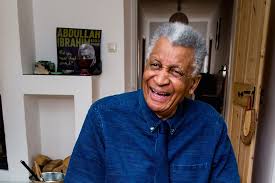

South African Jazz great Abdullah Ibrahim to embark on world tour at age 90
Renowned South African jazz master and pianist, Abdullah Ibrahim, is set to embark on an unprecedented world tour to celebrate...


Kenya unveils ‘killer-squad’ for Paris Olympics marathon Ahead of the 2024 Paris Olympic
Ahead of the 2024 Paris Olympic Games kicking off in July, Kenya has unveiled a “killer-squad” for the marathon event....
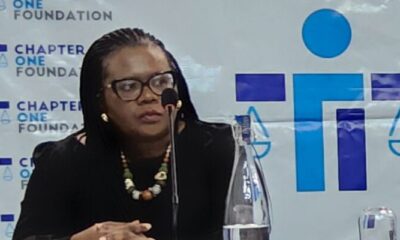

Civil society group says planned online regulation under IBA Act, an affront on media freedom (Video)
Chapter One Foundation Executive Director, Linda Kasonde, says the planned online regulation under the new Independent Broadcasting Authority (IBA) Act...


Clergyman raises concern over abuses associated with digital rights and freedom of expression
Emmanuel Kalulu, a clergy member from the Brethren Christ Church in Choma, has expressed concerns about the misuse of media...


Nigeria’s Dangote refinery set to get valid operating licence
The Nigerian government has revealed that the 650,000 barrels per day Dangote Petroleum Refinery will soon receive a full operating...


US wants UAE, others to cease support for Sudan’s warring parties
The United States wants all countries, including the United Arab Emirates, to stop helping the warring sides in Sudan, the...
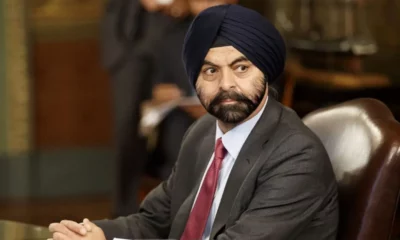

W’Bank chief Banga expects rich nations to meet Africa’s donation expectations
Ajay Banga, President of the World Bank, has said that he thinks donor countries will follow through on African leaders’...


Kenya: President Ruto assured of fresh IMF disbursement
This would help the economy, which is getting better after avoiding a debt problem earlier this year. Since the government...
Trending
-

 Tech2 days ago
Tech2 days agoVillage Capital partners Norad to launch climate-focused programme in Africa
-

 Sports2 days ago
Sports2 days agoCameroon’s boxing icon Francis Ngannou loses 15-month-old son
-

 VenturesNow24 hours ago
VenturesNow24 hours agoIn 30 years, half of Nigerian biscuit companies went out of business— Manufacturers
-

 Tech16 hours ago
Tech16 hours agoTanzania’s horticultural industry gets $2.1m grant from TradeMark Africa to boost market expansion


